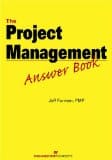Getting some answers: an interview with Jeff Furman
This blog is reader-supported. When you purchase something through an affiliate link on this site, I may earn some coffee money. Thanks! Learn more.
Jeff Furman is the author of The Project Management Answer Book. I asked him why he wrote it and what it was like putting the book together.
Hello, Jeff. Tell me why you wrote The Project Management Answer Book?
Hi, Elizabeth. When I approached the milestone of my 500th PM trained, I felt I had amassed a unique body of best practices (many inspired by my students) and I wanted to make them all available in a book.
And I wanted the book to be extremely practical, with a lot of hands-on tips and ready-to-use templates, so it would help PMs equally on the job and with the certification exams.
The book is all about answers. What’s your favourite question?
In my chapter, “Ethics In Project Management,” I ask the question: “What are microinequities, and how do they relate to xenophobia?”
This question came about from one of my
This sparked a great discussion on how xenophobia can take very subtle forms, where, for instance, team-members may not even realize they are treating their virtual coworkers unfairly. And it was a very memorable learning moment for all participants.
What was the writing process like?
With the Q&A format of the book, I was able to get many of the questions down in advance, before working on the answers. I started by taking each key point from my
I put together from various questions and responses in class.
And as I would remember a student who had some trouble with a formula or concept, I would write the Q&A partly with them in mind. In fact, one of my students who just read the book after taking my class a couple of years ago wrote and told me: “It’s funny, because I actually see myself in your questions and answers.”
How long did it take to write?
The first draft took a very solid six months of full-time writing, where I worked on the book basically all day, every day when I wasn’t teaching, including most weekends (many thanks to my wife Martha Garvey for her understanding and her expert suggestions – she has written two books of her own on pet nutrition).
Then there were two rounds of review and revisions with my editor over several more months, where we polished it up (Kaizen!).
That’s a long time! Which was the hardest bit to write?
The hardest chapter was probably “Managing Your Human Resources.” There is no one catch-all answer to HR issues, the way there is for some of the hard skills, so that’s a challenge. There’s also a great deal of source material to select from, and I wanted to work from the original writings as much as I could, from the books by the motivational pioneers (Maslow, McGregor, Herzberg, Fiedler, Vroom, McClelland). I wound up learning quite a bit in researching this chapter. But then I had the constraint to boil down as much as I could into just one or two Q&A’s on each theory.
And one might think that everything is available on the Internet nowadays. But I had to take a lot of trips into Manhattan to find those rare books. Many are browse-only at the famous NYC Public Library on 5th Avenue — the one guarded by the lions!
Where can people get more information about your book?
I’ve been lucky to do some very fun interviews (podcasts, blogs, and webinars) where people can learn about the book and also get a lot of good project management tips for free:
My interview with Cornelius Fichtner, host of The Project Management Podcast was Episode #168: “The Project Management Answer Book”.
And I gave a live Webinar/call-in event about the book which was an interview by Henry Will called “Pitfalls For PMs,” for his group, PM Lessons Learned.
The publisher is Management Concepts (Vienna, Virginia) and you can find out more on their website or my own website/blog.
Thanks, Jeff!

